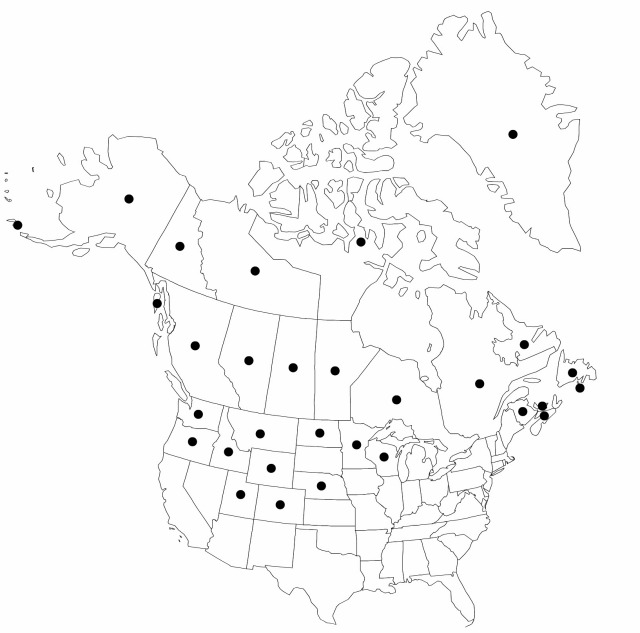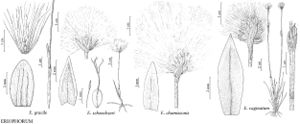Eriophorum chamissonis
in C. F. Ledebour, Fl. Altaica 1: 70. 1829.
Plants colonial from long-creeping rhizomes. Culms solitary or few together, somewhat trigonous, (20–)30–70(–80) cm, stout, to 1.5(–4) mm diam. basally; basal sheaths persistent, brown to purplish brown, septate-nodulose. Leaves: blades filiform, trigonous-channeled, (2–)3–10 cm × 1–2 mm; distal 1–2 leaf sheaths bladeless, inflated. Inflorescences: involucral bracts absent. Spikelets solitary, erect, globose in fruit, 1.5–2(–4) cm; scales blackish to purplish brown; proximal empty scales not more than 7, obovate or trigonous-obovate, 4–20 mm, margins white or paler, as wide as dark portion, apex blunt; distal scales obovate to ovate-lanceolate, margins hyaline, 1 mm wide or wider. Flowers: perianth bristles 10 or more, red-brown to white, 20–40 mm, smooth; anthers (0.6–)1.5–3 mm. Achenes oblong-obovoid, 2–2.7 mm, as wide as long, apex apiculate (0.3–0.5 mm). 2n = 58.
Phenology: Fruiting summer.
Habitat: Peat, bogs, marshes, muskegs
Elevation: 0–3000 m
Distribution

Greenland, St. Pierre and Miquelon, Alta., B.C., Man., N.B., Nfld. and Labr., N.W.T., N.S., Nunavut, Ont., P.E.I., Que., Sask., Yukon, Alaska, Colo., Idaho, Minn., Mont., Nebr., N.Dak., Oreg., Utah, Wash., Wis., Wyo., Eurasia.
Discussion
The Eriophorum chamissonis complex contains taxa based mainly on stem size and bristle color (M. Raymond 1954). Much of the variation appears to be continuous with abundant intermediates; experimental studies are needed to determine the biological basis of the variation.
Selected References
None.
